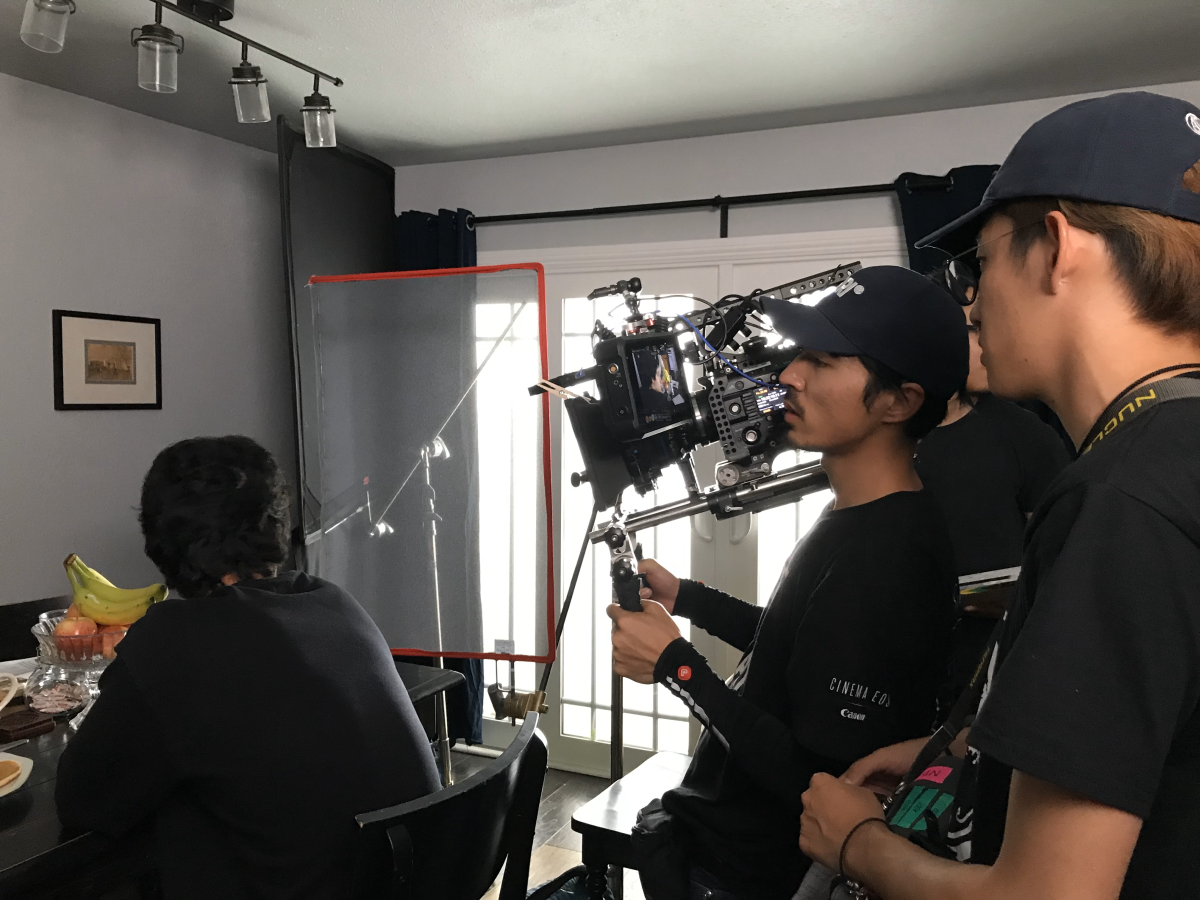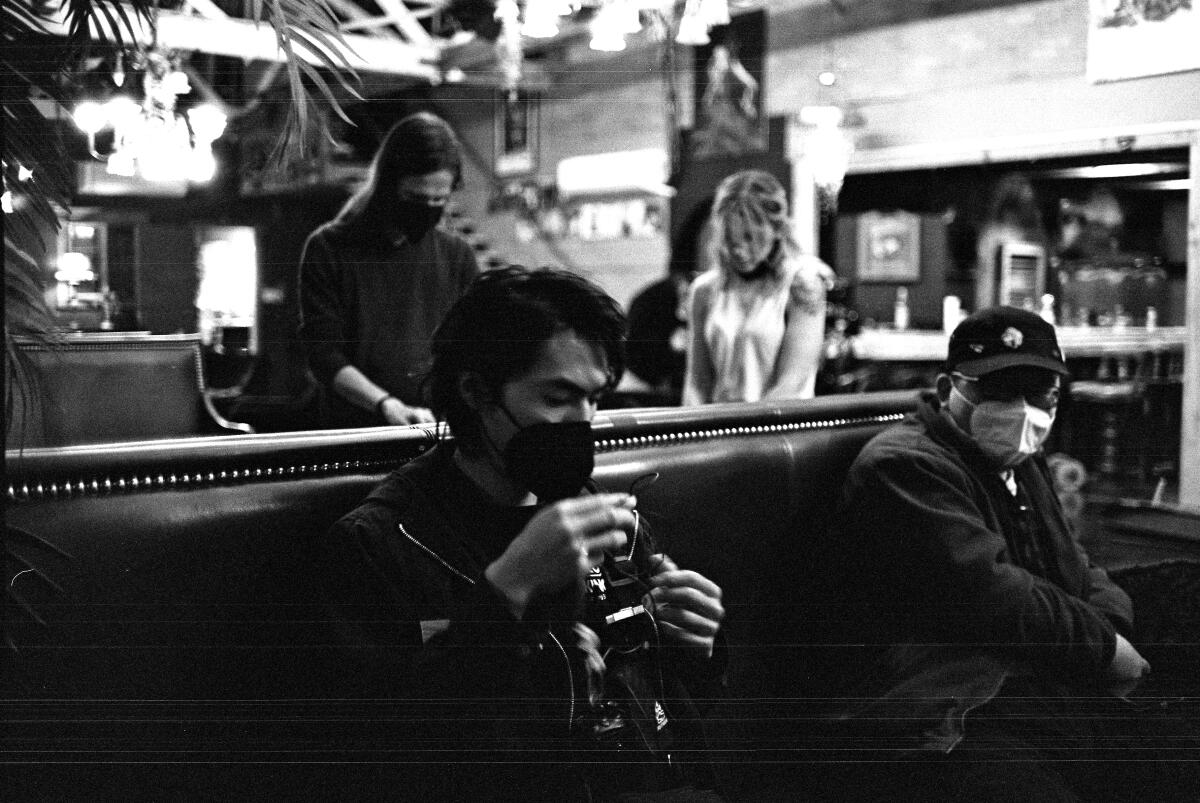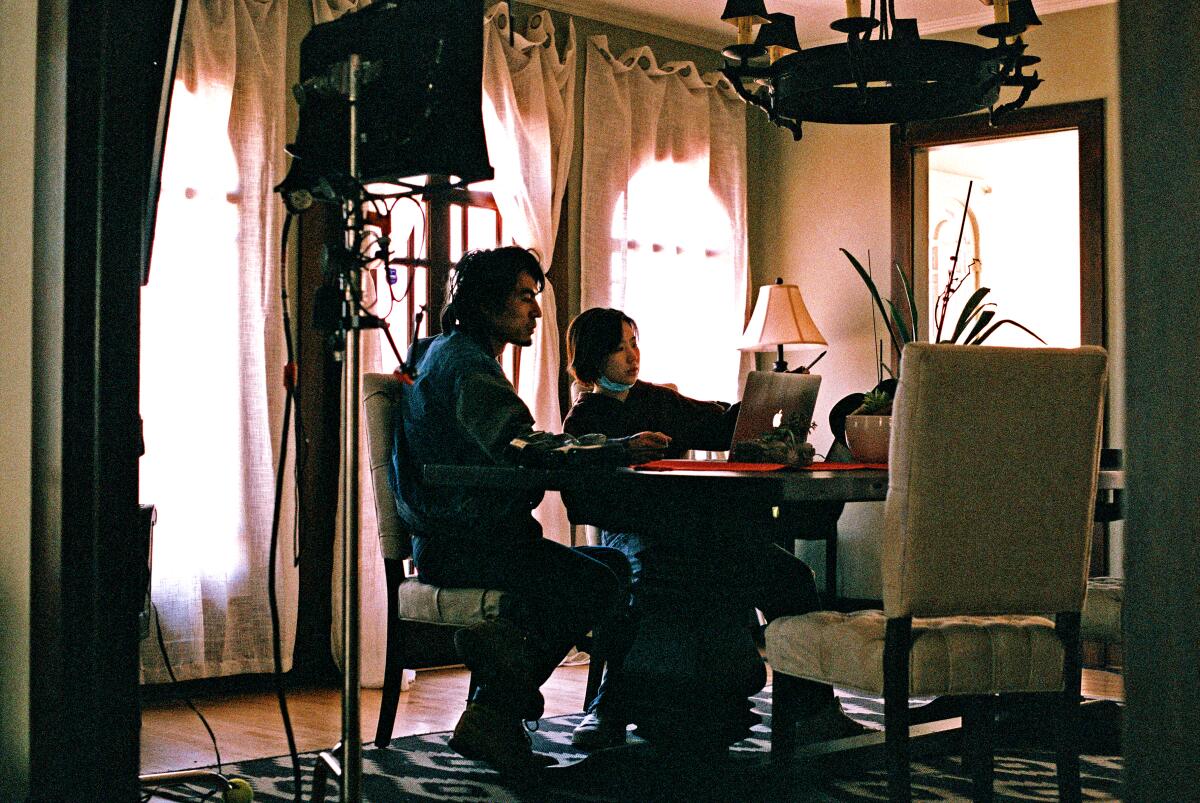His Hollywood dreams lured him from China. He was killed during a USC student film shoot

Under the noonday sun on April 15, cinematographer Peng Wang, 29, was in the back of an off-road vehicle traversing Imperial County’s sand dunes with three other filmmakers, working on a movie for the University of Southern California’s prestigious School of Cinematic Arts.
The otherworldly backdrop was the setting for a surreal short feature called “Finale,” about a man who journeys to his death in the desert. Wang was a third-year graduate student at Chapman University’s film school and had volunteered to help the USC crew complete their directing course project.
The team was running late and working on little sleep, having not reached their hotel until after midnight after a long drive from Los Angeles, said one crew member who declined to be named. They had just finished their first scene when the group went out to check the next location in the dunes. Minutes later, word came over the radio that the Can-Am Maverick had rolled over and Wang had been injured, the crew member said.
Despite emergency services’ efforts to resuscitate Wang, he died at the scene among the dunes, about a mile from the nearest road. He was wearing a helmet but not a safety harness, said Arturo Platero Jr., a California Highway Patrol spokesperson. An investigation, which is not criminal in nature, is underway, he said.
A week later, the film schools are still trying to figure out what happened. The tragedy comes six months after the shocking death of cinematographer Halyna Hutchins on the New Mexico set of the western movie “Rust,” which renewed widespread calls for safety improvements in filmmaking. Wang’s friends and classmates have been left devastated by the loss and questioned how the tragedy could have happened.
“He is a type of guy that is humble and traditional,” said Oliver Li, a Chapman graduate student film editor and Wang’s roommate, who found it difficult to imagine him flouting safety measures. “As long as he’s informed of the possible hazard, I don’t see a reason why they say he never had the seat belt. Why?”

A devout Christian who prayed before eating lunch on set, the Sichuan province native saw helping Chinese independent filmmakers achieve their dreams, whether or not they could pay, as a type of vocation, Li said.
“He’s not a guy who would search for fame or money,” he added.
Wang’s parents — a small-business owner and a factory worker in Chengdu — supported his dreams, his father said in a letter written after his death. But they could not underwrite his entire education. His financial straits became so difficult his second year at Chapman that he almost dropped out before the school came through with additional money, Li said.
Stephen Galloway, dean of Dodge College of Film and Media Arts at Chapman University, confirmed that the school had supported the student with grants and that he had already largely completed his coursework. It will award him his master of fine arts degree posthumously, he said.
Tears, horror and heartbreak are how Galloway described the reaction among the Orange County-based faculty to the loss of the popular student.
“This was the first and only serious incident involving any of our students in any of our memory,” Galloway said in an interview.
The pressure on film students can be considerable.
“There’s a lot of work if you’re a student, and filming is psychologically and physically taxing and that’s why you have to put very strict measures in place so that they are taught to keep themselves safe,” Galloway said.
He added the school has a full-time safety officer whose only role is to focus on the safety of student productions. The school has yet to confirm the details of what happened, Galloway said.
However, Peng Wang, who also went by Aaron, was volunteering on a project for a different school.
The production was an “authorized student project” for an intermediate directing course at USC, according to interviews and a film school certificate seen by The Times. That document shows that a graduate student named Ting Su got USC approval on April 5 for a shoot with a cast and crew of 10 or more. Su is listed as the director and another USC student, Bingliang Li, as the producer.
Lawyers representing Su and Li said in a joint statement that the students were deeply saddened by the accident and were cooperating with the investigation. “We think, before anybody makes any statements, that they should let the investigation play out,” the representatives said.
Li was driving the off-road vehicle at the time of the crash and Su was one of the passengers, according to the CHP.
Another document dated April 12, stamped by USC’s physical production department, was to allow the students to rent equipment. The haul included a generator, dolly, cables and a shelter tent with a replacement value of $20,000.
USC has not detailed publicly what information its student filmmakers disclosed to faculty and administrators about the production.
Reached by phone, the dean of the university’s School of Cinematic Arts, Elizabeth Daley, noted that there were “legal issues here” and declined to comment.
“I am under instructions not to discuss this and I intend to follow those instructions,” she said.
A subsequent statement from the university suggested the students had gone rogue in using an off-road vehicle and shooting in the Imperial Sand Dunes Recreation Area, a remote expanse of desert three hours and more than 230 miles from the USC campus.

The university said under policies governing all student productions at its School of Cinematic Arts, “any shoot taking place more than 50 miles away from our campus, or involving the use of all-terrain vehicles, would have required very specific approvals from the school.”
“We are unaware of any such approvals having been requested or provided in this tragic matter,” the statement said.
It was unclear where the film crew rented the vehicle. Companies that rent similar vehicles said that no special permits or training are required for adults to operate the vehicles.
“They drive just like a car,” said Jason Davis, who owns an Arizona company that rents vehicles like the four-seater “side by side” that the crew was using. He and others said most rollovers occur when the driver makes a sharp turn.
“We get our side by sides rolled all the time. We’ve never had a death, never had a broken arm,” Davis said.
The death has been a blow for Wang’s university friends with whom he collaborated on various projects.
Xiaojun “Teddy” Jian, a roommate and friend of Wang, is a graduate student at Chapman focusing on cinematography and was one of at least two Chapman students Wang asked to work with him on the USC film shoot.
Before the shoot, the USC film production was notably disorganized, Jian said. The script changed repeatedly and the filmmakers seemed strapped for time to prepare but unwilling to cancel the shoot, he said.
Even with the uncertainty, Jian said that it was hard for aspiring filmmakers to turn away on-set work, even unpaid.
“Cinematography students would love to shoot as many [films] as we can to get more experience and have more things to put on their resume or portfolio,” he said.
Jian said that USC declined to insure the filmmakers because the reimbursement value of the cameras and other equipment was too high. The process of finding different insurance was time-consuming, delaying the crew even further as it prepared to leave for the shoot.
Jian had to drop out of the shoot because of a conflict and was at home the afternoon of April 15 when a crew member from Chapman called with news that Wang had been injured and asked him to look for his health insurance information.
Jian made a fruitless search and then called the classmate from Wang’s bedroom to say he couldn’t find a card.
“She told me that he is dead already,” Jian recalled.
“The thing I felt was just empty and nothing,” he said. “I just lay down on his bed. I don’t know how long.”
The Chinese Consulate in Los Angeles and Chapman students have been in contact with Wang’s parents. His family wants to come to the U.S. to collect his body, which remains in a morgue in Imperial County pending an autopsy.
Chapman students are raising money to help the family pay for the trip, according to Patrick Skeyhill, student body president of the graduate film program. The university also plans to help cover costs, Galloway said.
Skeyhill shared the letter written by Wang’s father. In it, Hualun Wang detailed how the family was already struggling because of the contributions they had made to their son’s education and the serious illnesses of his grandmother and uncle, and described his admiration for his son.
“He was exemplary in both character and duty,” Hualun Wang wrote, adding, “My son died pursuing what he loved.”
More to Read
Inside the business of entertainment
The Wide Shot brings you news, analysis and insights on everything from streaming wars to production — and what it all means for the future.
You may occasionally receive promotional content from the Los Angeles Times.












